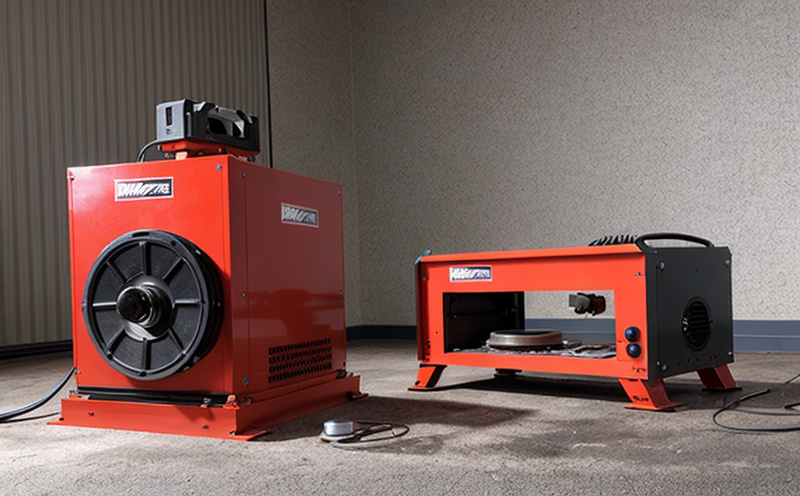ASTM D775 Transit Drop and Impact Durability Testing
The ASTM D775 transit drop impact durability test is a critical procedure used to evaluate the resistance of materials, components, or assemblies to shock loading during transportation. This test simulates the real-world conditions encountered by products in transit, ensuring they can withstand impacts without failure.
This standardized testing method is part of the broader scope of acoustics, vibration, and noise testing within the transport sector. The ASTM D775 protocol assesses how materials or components perform under a series of controlled impact events to mimic the forces experienced during transit. This test can be particularly useful for assessing the durability of automotive parts, electronics enclosures, and other products that travel by road, rail, sea, or air.
The ASTM D775 test involves dropping a specimen from various heights onto a rigid surface, typically a steel anvil. The height and frequency of these drops are carefully controlled to simulate the impact conditions encountered during transit. Specimens may include materials such as plastics, composites, metals, or assemblies made from these materials.
The primary focus of this test is on the impact resistance properties of the material under consideration. However, it also indirectly tests the structural integrity and design robustness of the components involved. Proper specimen preparation is crucial for accurate testing results; specimens must be free from defects, cracks, or other imperfections that could affect the outcome.
The ASTM D775 test can help manufacturers ensure their products meet regulatory requirements and industry standards. Compliance with this standard demonstrates a commitment to quality and reliability, which can enhance brand reputation and customer trust.
Understanding the broader context of acoustics, vibration, and noise testing is important for appreciating the significance of ASTM D775 within the transport sector. Vibration testing complements impact testing by focusing on the long-term effects of dynamic loading on materials or components. Together, these tests provide a comprehensive evaluation of product durability in challenging environmental conditions.
The acceptance criteria for ASTM D775 involve assessing whether the specimen retains its structural integrity and functionality after undergoing the prescribed number of impacts. If the specimen deforms permanently or fails to perform as expected post-impact, it is deemed non-compliant with the standard.
Incorporating ASTM D775 into a product development process can help identify potential weaknesses early in the design phase, allowing for necessary modifications before mass production begins. This proactive approach not only enhances product reliability but also reduces costly recalls and warranty claims post-launch.
Benefits
- Enhanced Product Reliability: Demonstrates that products can withstand the rigors of transportation, improving overall customer satisfaction.
- Compliance with Industry Standards: Ensures compliance with ASTM D775 and other relevant standards, enhancing brand reputation and marketability.
- Reduced Development Time: Identifies potential issues early in the development process, streamlining product launches.
- Cost Savings: By identifying failures during testing rather than after launch, significant savings can be achieved on recall costs and warranty claims.
The ASTM D775 test provides valuable insights into how materials or components behave under impact conditions. This information is crucial for optimizing product design and ensuring it meets the stringent demands of the transport sector.
For quality managers, compliance officers, R&D engineers, and procurement teams, ASTM D775 testing offers a robust framework to evaluate material properties and component durability. The test results can be used to make informed decisions about material selection, design optimization, and production processes.
Eurolab Advantages
At Eurolab, we offer comprehensive ASTM D775 testing services that are second to none. Our state-of-the-art facilities and experienced technical staff ensure that your products receive the most accurate and reliable testing possible.
- Advanced Equipment: Equipped with high-precision impact testers that meet or exceed ASTM standards, providing consistent and repeatable test results.
- Expertise in Transport Sector: Our team of engineers has extensive experience in acoustics, vibration, and noise testing, ensuring you receive specialized advice tailored to your specific needs.
- Comprehensive Reporting: Detailed reports are provided for every test run, offering insights into the performance of your products under impact conditions. These reports can be used for internal decision-making or submitted to regulatory bodies if required.
- Prompt Turnaround Time: We understand the importance of timely results and strive to provide rapid turnaround times without compromising on quality.
Choosing Eurolab as your ASTM D775 testing partner means you are working with industry experts who possess a deep understanding of the transport sector. Our services not only meet but often exceed client expectations, ensuring that your products are robust and reliable in real-world conditions.
Competitive Advantage and Market Impact
The ability to demonstrate compliance with ASTM D775 can provide a significant competitive advantage. In an increasingly globalized market, meeting or exceeding international standards is crucial for maintaining a strong position in the industry.
- Increased Brand Reputation: Demonstrating your commitment to quality and reliability through compliance with ASTM D775 enhances brand reputation and customer trust.
- Better Product Performance: By ensuring that products meet rigorous testing standards, you can improve their overall performance and durability, leading to higher customer satisfaction and loyalty.
- Potential for New Market Opportunities: Compliance with ASTM D775 opens up new market opportunities by allowing you to target customers in regions where this standard is mandatory or preferred.
The market impact of ASTM D775 compliance extends beyond individual companies. By setting a high bar for product durability, the industry as a whole benefits from more robust and reliable products that perform better under real-world conditions. This collective improvement can lead to broader acceptance and adoption of advanced materials and technologies.





